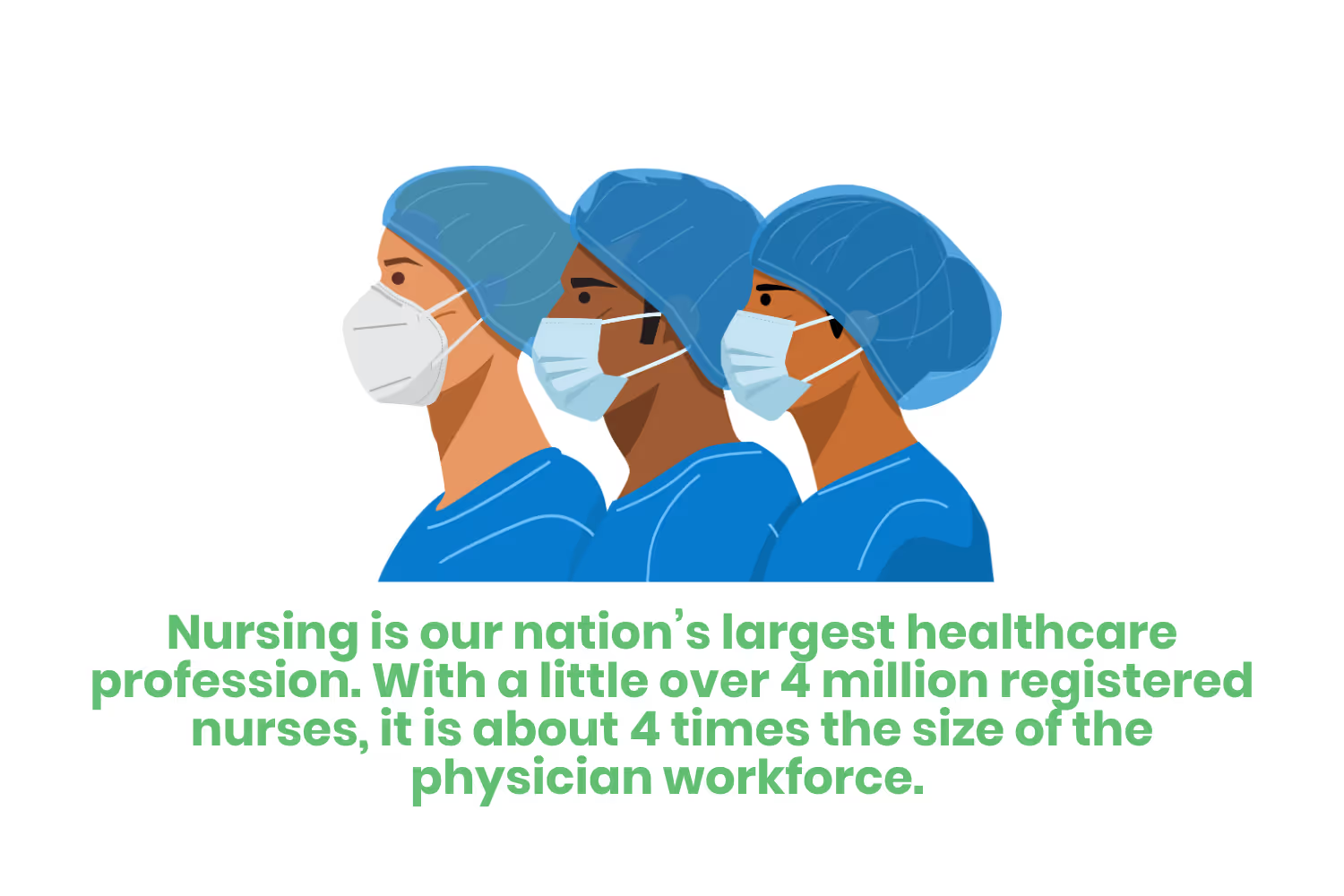6 Boundless Benefits of Continuing Education of Nurses
Continuing education is important for nurses everywhere. Embracing lifelong learning benefits patients and healthcare workers. Here are the 6 benefits of the continuing education of nurses.

Nursing is our nation’s largest healthcare profession. With a little over 4 million registered nurses, it is about 4 times the size of the physician workforce.
Nurses play an essential role in patient care, in every healthcare setting. To provide the best service, they must stay up-to-date with the latest information.

The healthcare field is changing at a rapid rate. We see new technologies, treatments, and research emerging daily. In fact, there are over 400,000 healthcare apps available with over 200 more getting added every day.
With this in mind, continuing education is important for nurses everywhere. Embracing lifelong learning benefits patients and healthcare workers. Oh, and continuing education also happens to be a requirement to continue being a nurse so there’s that.
Why Continued Education?
The scope of work for any healthcare professional is inherently diverse and unpredictable. Add on emerging medical breakthroughs, diseases, and updates to processes/procedures. That's a lot to consider!
While fundamental nursing education provides basic competency, it doesn’t equal practice readiness. Practice readiness means a nurse can perform tasks while communicating and thinking critically.
This is why the creation of post-licensure-based learning systems is necessary. These programs, or Continued Education Units (CEUs), are perfect for filling in the gaps in prelicensure education. CEUs must meet the standards of a recognized organization in order to count.

A few notable CEU accreditation organizations include…
- The American Association of Nurse Practitioners (AANP)
- American Nurses Credentialing Center (ANCC)
- National Association of Pediatric Nurse Practitioners (NAPNAP)
- Accreditation Council for Continuing Medical Education (ACCME)
Through continued education, nurses and other healthcare workers can better provide quality care. As well as adhere to state and federal regulations and add to the advancement of healthcare.
Nursing is both an art and a science. So integrating knowledge into practice can help you gain experience you might otherwise miss. Plus gain the ability to reflect on situations from new perspectives. Here are a few benefits to expect from continued education as a nurse.
Benefit 1: Enhancing Patient Outcomes
As a patient, you expect to receive quality care. As you should! Receiving quality and evidence-based care can mean the difference between life and death.
Nurses should feel comfortable in their abilities to deliver proper care. No matter the situation. Continuing education equips nurses with the tools and knowledge to provide this quality care. Understanding disease, proper protocols, and practices help to improve nurses’ critical thinking abilities.
Note that continued education doesn’t just pertain to healthcare-specific topics. Staying up to date on HIPAA regulations and compliance standards is necessary. Compliance training can save you from a large fine or even jail time.
Knowledge and continued practice equip nurses to make informed decisions. As well as recognize early warning signs and intervene in emergencies quickly. Because of this, patient outcomes improve as well as healthcare delivery.
Benefit 2: Career Advancement Opportunities
If you’re a nurse that’s looking to advance your career, continued education is the way to go.
Taking extra courses on a variety of subjects plays a vital role in being able to grow as a professional. By pursuing extra certifications, nurses expand their knowledge and their wheelhouse of expertise. This offers a competitive edge when it comes to earning promotions.
These certifications look great on an application for leadership roles, too!
Expanding professional opportunities doesn’t always have to take a lot of time and money. Of course, there are more advanced degrees that nurses can obtain to grow in their practice. But there are also options such as workshops, special courses, and online certifications. The best part is that these are available from the comfort of your home and for a fraction of the price.
Employers capitalize on hiring and promoting nurses who show a desire for ongoing learning.
By continuously updating both knowledge and skills, nurses can unlock doors to:
- Leadership positions.
- Advanced practice roles.
- Research opportunities.
- Teaching positions.
Benefit 3: Keeping Up With Regulatory Requirements
Healthcare regulatory organizations often mandate a certain number of credits. These credits are for maintaining licensure and certification. To help ensure their credentials remain valid, nurses should count on continuing education units to help them meet these obligations. Not to mention continue to broaden their knowledge base.
Staying informed about the requirements of licensing ensures that nurses maintain compliance standards while at work and maintain professional credibility. Continuing education units help strengthen nurses’ clinical competence.
Benefit 4: Financial Benefits
As an employer, investing in continued education programs can help with return on investment. Again, it might seem like a large investment to assist your employees in education, but it pays for itself!
Let’s talk about training. It’s more cost-effective to enhance the skills of your current employees with CEUs. Hiring new employees is more expensive, even if they have the desired credentials you’re looking for. We’re talking about another salary, time taken from the floor to train this person, and the possibility that they may not even work out.
Investing in your staff fosters a sense of support and teamwork. With CEUs, nurses are more likely to feel supported in their job performance. This sort of job support can create more engagement within your team.
Nurses with a higher sense of professional engagement tend to feel:
- A sense of job performance satisfaction.
- Confidence in job involvement without fear/stress of negative consequences.
- Feelings of a reliable, safe and predictable workplace.
When you reach high levels of work engagement:
- Contagious personal initiative occurs.
- Hospital mortality decreases.
- Organizations’ financial profitability significantly increases.
Benefit 5: Personal Growth
Nurses may find opportunities for personal growth by continuing their education.
With access to different learning programs, nurses can explore their passions as well as discover new interests.
Having a space to practice skills also serves to build professional confidence. Installing a sense of fulfillment and pride in someone’s achievements can help reduce burnout as well.
Benefit 6: Maintaining Your License
If you’re a nurse, you likely already knew before reading this blog post that you’re required to take a specific amount of CEUs every year in order to maintain your license to practice medicine.
Beyond being a mandate, your yearly CEU requirements are also a benefit.
You see, all of the benefits mentioned thus far are exactly why nursing licensing bodies and state governments require you to take CEUs. Thus, you shouldn’t view your mandated CEU hours as “work”, take a more positive approach and view it as a way to further enhance your profession and industry.
Continuing Education Units
Nurses have an obligation to their patients and their employers to have a sound understanding of the scope of their practice. They also must strive to have confidence in their ability to offer safe care to those they treat. In order to do this, there must be a reliable source of information to readily tap into.
Note that each state also has a set of guidelines concerning continued education. This includes accumulating a specific number of continuing education hours or credits. Subjects may include issues like domestic abuse reporting or signs of human trafficking.
There are many ways to engage in continued education, some more flexible than others. Here are a few examples of the different types of education courses:
- Self-study exams
- College entrance examinations
- Correspondence courses
- Online education
Self-study exams are the preferred medium of learning. In comparison to the other routes of education, the advantages are obvious. Two of which are quick effectiveness and low cost. Approximately 65.6% of nurses prefer self-study courses due to these reasons.
Besides finding training that fits into their schedule, educational programs should capture attention. Researchers found that CEUs that provide engaging content are more impactful. Passive listening can become monotonous and, for lack of a better word, boring.
Some examples of nursing courses offered through CEUs include:
- Adolescent Substance Use
- Behavioral Health: Screening and Intervention
- Childhood and Adolescent Depression
- Food and Housing: Screening and Intervention
- Immunization
- Treating Children with Asthma
- Treating Post Concussion Syndrome
- Welcoming Patient to Your Practice: 2022 Update
Conclusion
Healthcare is a dynamic world of constant changes and updates. Because of this, continuing education is no longer just an option. It’s now a necessary step for all nurses to take.
Lifelong learning holds many benefits in this field of work, and this blog only went over a small number of them. Nurses can better adapt and change in the healthcare field through CEUs. Most of the time without disturbing their already busy schedules.
Through CEUs, nurses can improve patient outcomes and advance their careers. Employers can safeguard their business. As a nurse, you should seize every opportunity you get to partake in lifelong learning. As an employer, invest in your team by offering CEUs. You will see a return for your effort!
Emphasize your product's unique features or benefits to differentiate it from competitors
In nec dictum adipiscing pharetra enim etiam scelerisque dolor purus ipsum egestas cursus vulputate arcu egestas ut eu sed mollis consectetur mattis pharetra curabitur et maecenas in mattis fames consectetur ipsum quis risus mauris aliquam ornare nisl purus at ipsum nulla accumsan consectetur vestibulum suspendisse aliquam condimentum scelerisque lacinia pellentesque vestibulum condimentum turpis ligula pharetra dictum sapien facilisis sapien at sagittis et cursus congue.
- Pharetra curabitur et maecenas in mattis fames consectetur ipsum quis risus.
- Justo urna nisi auctor consequat consectetur dolor lectus blandit.
- Eget egestas volutpat lacinia vestibulum vitae mattis hendrerit.
- Ornare elit odio tellus orci bibendum dictum id sem congue enim amet diam.
Incorporate statistics or specific numbers to highlight the effectiveness or popularity of your offering
Convallis pellentesque ullamcorper sapien sed tristique fermentum proin amet quam tincidunt feugiat vitae neque quisque odio ut pellentesque ac mauris eget lectus. Pretium arcu turpis lacus sapien sit at eu sapien duis magna nunc nibh nam non ut nibh ultrices ultrices elementum egestas enim nisl sed cursus pellentesque sit dignissim enim euismod sit et convallis sed pelis viverra quam at nisl sit pharetra enim nisl nec vestibulum posuere in volutpat sed blandit neque risus.

Use time-sensitive language to encourage immediate action, such as "Limited Time Offer
Feugiat vitae neque quisque odio ut pellentesque ac mauris eget lectus. Pretium arcu turpis lacus sapien sit at eu sapien duis magna nunc nibh nam non ut nibh ultrices ultrices elementum egestas enim nisl sed cursus pellentesque sit dignissim enim euismod sit et convallis sed pelis viverra quam at nisl sit pharetra enim nisl nec vestibulum posuere in volutpat sed blandit neque risus.
- Pharetra curabitur et maecenas in mattis fames consectetur ipsum quis risus.
- Justo urna nisi auctor consequat consectetur dolor lectus blandit.
- Eget egestas volutpat lacinia vestibulum vitae mattis hendrerit.
- Ornare elit odio tellus orci bibendum dictum id sem congue enim amet diam.
Address customer pain points directly by showing how your product solves their problems
Feugiat vitae neque quisque odio ut pellentesque ac mauris eget lectus. Pretium arcu turpis lacus sapien sit at eu sapien duis magna nunc nibh nam non ut nibh ultrices ultrices elementum egestas enim nisl sed cursus pellentesque sit dignissim enim euismod sit et convallis sed pelis viverra quam at nisl sit pharetra enim nisl nec vestibulum posuere in volutpat sed blandit neque risus.
Vel etiam vel amet aenean eget in habitasse nunc duis tellus sem turpis risus aliquam ac volutpat tellus eu faucibus ullamcorper.
Tailor titles to your ideal customer segment using phrases like "Designed for Busy Professionals
Sed pretium id nibh id sit felis vitae volutpat volutpat adipiscing at sodales neque lectus mi phasellus commodo at elit suspendisse ornare faucibus lectus purus viverra in nec aliquet commodo et sed sed nisi tempor mi pellentesque arcu viverra pretium duis enim vulputate dignissim etiam ultrices vitae neque urna proin nibh diam turpis augue lacus.




